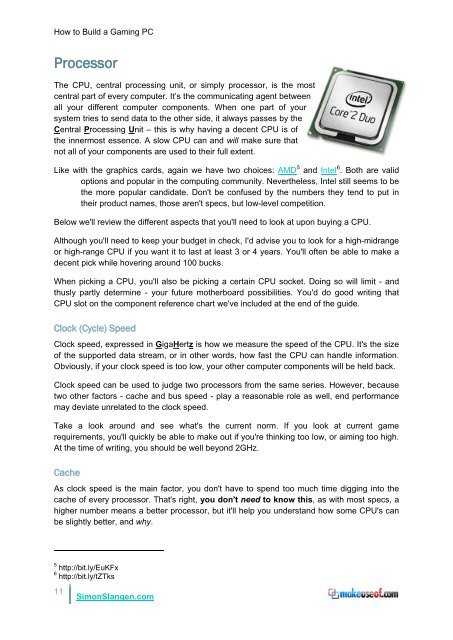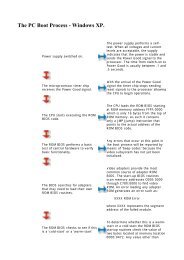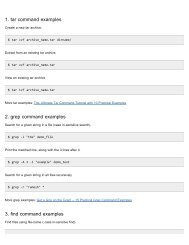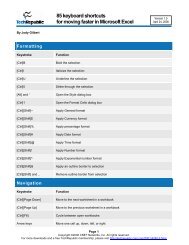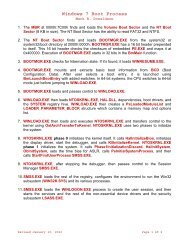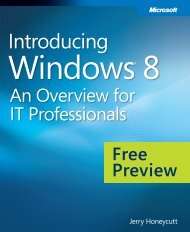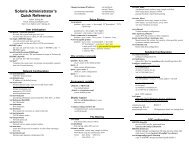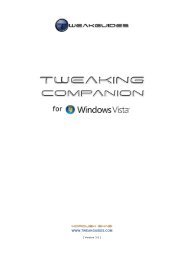Build a Gaming PC.pdf
Build a Gaming PC.pdf
Build a Gaming PC.pdf
You also want an ePaper? Increase the reach of your titles
YUMPU automatically turns print PDFs into web optimized ePapers that Google loves.
How to <strong>Build</strong> a <strong>Gaming</strong> <strong>PC</strong><br />
Processor<br />
The CPU, central processing unit, or simply processor, is the most<br />
central part of every computer. It’s the communicating agent between<br />
all your different computer components. When one part of your<br />
system tries to send data to the other side, it always passes by the<br />
Central Processing Unit – this is why having a decent CPU is of<br />
the innermost essence. A slow CPU can and will make sure that<br />
not all of your components are used to their full extent.<br />
Like with the graphics cards, again we have two choices: AMD 5<br />
6<br />
and Intel . Both are valid<br />
options and popular in the computing community. Nevertheless, Intel still seems to be<br />
the more popular candidate. Don't be confused by the numbers they tend to put in<br />
their product names, those aren't specs, but low-level competition.<br />
Below we'll review the different aspects that you'll need to look at upon buying a CPU.<br />
Although you'll need to keep your budget in check, I'd advise you to look for a high-midrange<br />
or high-range CPU if you want it to last at least 3 or 4 years. You'll often be able to make a<br />
decent pick while hovering around 100 bucks.<br />
When picking a CPU, you'll also be picking a certain CPU socket. Doing so will limit - and<br />
thusly partly determine - your future motherboard possibilities. You'd do good writing that<br />
CPU slot on the component reference chart we've included at the end of the guide.<br />
Clock (Cycle) Speed<br />
Clock speed, expressed in GigaHertz is how we measure the speed of the CPU. It's the size<br />
of the supported data stream, or in other words, how fast the CPU can handle information.<br />
Obviously, if your clock speed is too low, your other computer components will be held back.<br />
Clock speed can be used to judge two processors from the same series. However, because<br />
two other factors - cache and bus speed - play a reasonable role as well, end performance<br />
may deviate unrelated to the clock speed.<br />
Take a look around and see what's the current norm. If you look at current game<br />
requirements, you'll quickly be able to make out if you're thinking too low, or aiming too high.<br />
At the time of writing, you should be well beyond 2GHz.<br />
Cache<br />
As clock speed is the main factor, you don't have to spend too much time digging into the<br />
cache of every processor. That's right, you don't need to know this, as with most specs, a<br />
higher number means a better processor, but it'll help you understand how some CPU's can<br />
be slightly better, and why.<br />
5 http://bit.ly/EuKFx<br />
6 http://bit.ly/tZTks<br />
11<br />
SimonSlangen.com


